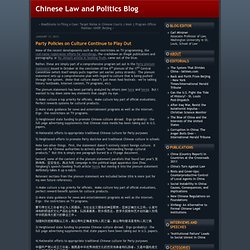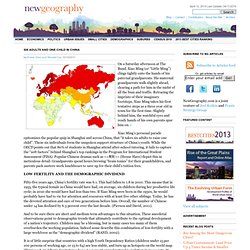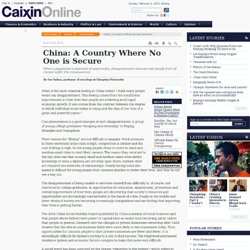

Chinese Law and Politics Blog: Party Policies on Culture Continue to Play Out. None of the recent developments such as the restrictions on TV programming, the real-name registration efforts for microblogs, the crackdown on illegal publications and pornography, or Hu Jintao’s article in Seeking Truth, came out of the blue.

Rather, these are simply part of a comprehensive program set out in the Party plenum statement issued in October at the conclusion of the 6th plenum of the 17th Central Committee (which itself simply pulls together yet earlier policy strands). The plenum statement sets up a comprehensive plan with regard to culture that is being pushed through the system. (Note that culture doesn’t just mean food festivals – we’re talking history textbooks, Internet content, TV programs, etc). The plenum statement has been partially analyzed by others (see here and here). But I wanted to lay down some key elements that caught my eye. 1) Make culture a top priority for officials. 2) More state guidance for news and entertainment programs as well as the internet.
Six Adults and One Child in China. On a Saturday afternoon at The Bund, Xiao Ming (or “Little Ming”) clings tightly onto the hands of his paternal grandparents.

His maternal grandparents walk slightly ahead, clearing a path for him in the midst of all the buzz and traffic. Retracing the imprints of their imaginary footsteps, Xiao Ming takes his first tentative steps as a three year old in town for the first time. Slightly behind him, the watchful eyes and ready hands of his own parents spur him on. 1 Xiao Ming’s personal parade epitomises the popular quip in Shanghai and across China, that “it takes six adults to raise one child”. These six individuals form the unspoken support structure of China’s youth: While the OECD points out that 80% of students in Shanghai attend after-school tutoring, it fails to capture the “soft factors” behind Shanghai’s top rankings in the Program for International Student Assessment (PISA). Fifty-five years ago, China’s fertility rate was 6.1. Right now the situation seems dire. 王霞. 2006. China: A Country Where No One is Secure. When a population is deprived of opportunity, disappointment abounds and people from all classes suffer the consequences By Guo Yuhua, professor of sociology at Tsinghua University What is the most common feeling in China today?

I think many people would say disappointment. This feeling comes from the insufficient improvement in their lives that people are achieving amid rapid economic growth. It also comes from the contrast between the degree to which individual social status is rising and the idea of the "rise of a great and powerful nation. " One phenomenon is a good example of such disappointment: A group of young college graduates "escaping and returning" to Beijing, Shanghai and Guangzhou. Their reasons for "fleeing" are not difficult to imagine. The disappointment of being unable to extricate oneself from difficulty is, of course, not restricted to college graduates. The Party: The Secret World Of China's Communist Rulers - Video and audio - News and media.